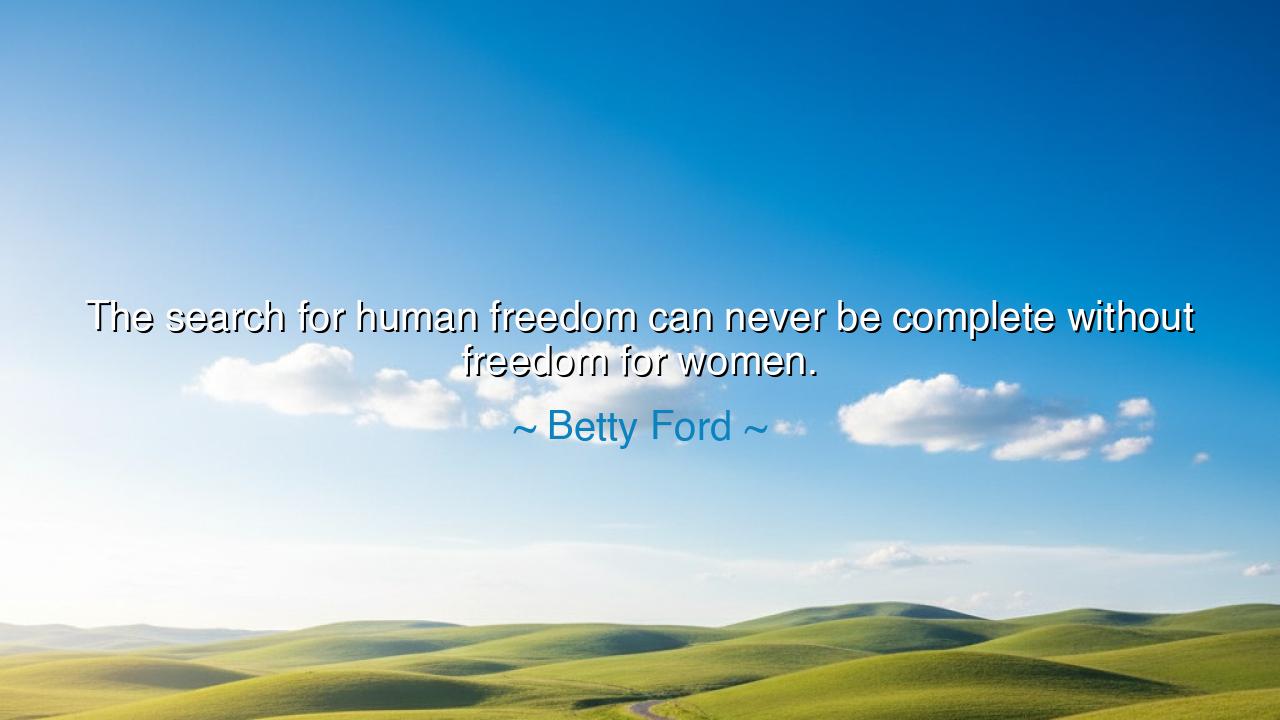
The search for human freedom can never be complete without






When Betty Ford declared, “The search for human freedom can never be complete without freedom for women,” she spoke as one who understood the hollowness of liberty that excludes half of humanity. Her words are a torch in the long march of justice, reminding us that the cry for freedom is but an empty echo if it does not embrace women. A nation may sing of liberty, raise monuments to independence, and boast of progress, but if its daughters remain bound, its freedom is a fractured thing, a song sung with only half a voice.
The ancients knew this paradox well. In Athens, the birthplace of democracy, men debated the meaning of liberty in the Assembly, yet their wives and daughters lived in silence behind closed doors. Rome too exalted the rights of its citizens while denying them to half its people. Betty Ford’s words expose this ancient hypocrisy: that the search for human freedom has too often been proclaimed as universal while practiced as partial, leaving women to struggle for their rightful place within it.
History provides vivid testimony. In America, the abolition of slavery brought liberty to millions, yet women who had fought side by side in that cause found themselves excluded from its fruits. Leaders like Elizabeth Cady Stanton and Susan B. Anthony rose to declare that until women had the ballot, the Republic’s claim to freedom was incomplete. Betty Ford, in the twentieth century, echoed their call, reminding her own generation that no progress is true progress while women remain less than free.
Her words are also a challenge to the complacent. For the search for freedom is not a task completed in one generation, nor is it secured by partial victories. Each step forward reveals new chains yet to be broken. To forget the plight of women in this pursuit is to betray the very principle of liberty itself. Only when women walk with men as equals in dignity, opportunity, and voice, can humanity say it has truly found freedom.
Thus, let her wisdom be passed down: do not mistake a half-light for the dawn. A world where men are free but women are bound is still a world in chains. The freedom of women is not an ornament to liberty, but its foundation. And until that foundation is secure, the temple of human freedom will stand incomplete, trembling before the judgment of history.






AMHoang Anh Minh
Betty Ford’s statement really makes you reflect on the idea of freedom. If women are still fighting for their rights, can we really say that the fight for human freedom is over? It’s frustrating how women’s liberation is often treated as a secondary or separate issue when in reality, it is central to any genuine pursuit of freedom. How can we ensure that women’s freedom is woven into the fabric of human freedom moving forward?
VAPham Van Anh
This quote by Betty Ford makes me think about how much more needs to be done for women to experience true freedom. If we look at historical and even contemporary struggles for women’s rights, we see that freedom for women is often the exception, not the rule. How can we change the narrative so that women's rights are seen as integral to the larger human rights movement? Is the fight for freedom truly complete if women are still oppressed in so many ways?
TLThanh Le
Betty Ford’s quote raises an essential truth. Women’s freedom is often sidelined in discussions about human rights, but how can we claim to have achieved true freedom when women’s struggles are still so prevalent? I wonder, what would it take for women’s rights to be fully integrated into the broader fight for freedom? How do we shift from seeing these issues as secondary to considering them central to the broader movement for equality?
HHHai Hoang
I agree with Betty Ford that the pursuit of human freedom can never be truly complete without women's freedom. It’s striking how often the struggles for women's rights are treated as secondary in broader conversations about freedom. Why do we still have to debate fundamental rights like equal pay, reproductive freedom, and access to education? Is it possible for societies to be truly free when women are still fighting for their autonomy?
TNMai 9A Nguyen Thi Ngoc
Betty Ford's statement about freedom and women is incredibly powerful. It challenges the very idea of freedom by highlighting the inherent inequality that exists when half of the population is denied it. Why is it that women’s freedom is often treated as an afterthought? How can we truly call ourselves free if women are still fighting for basic rights? What actions can we take to ensure women’s freedom is fully realized in every society?